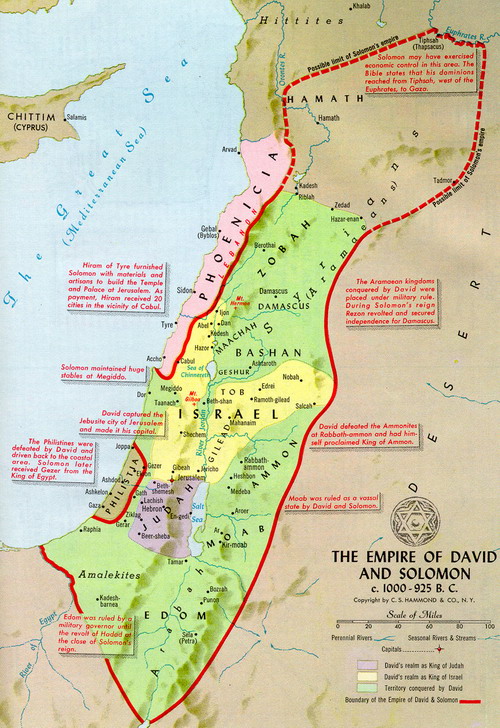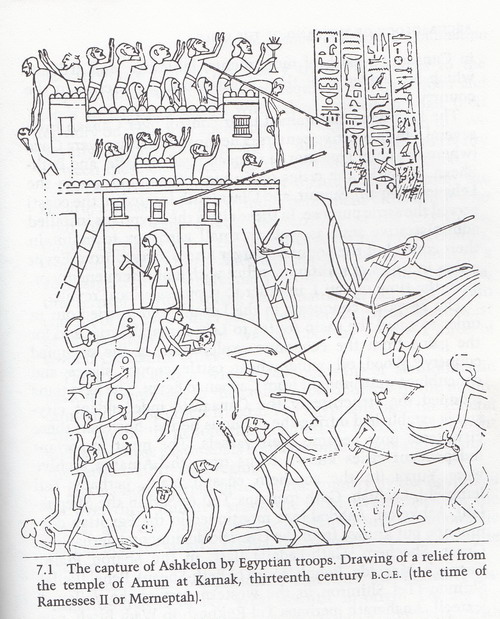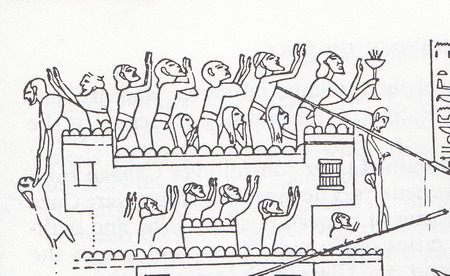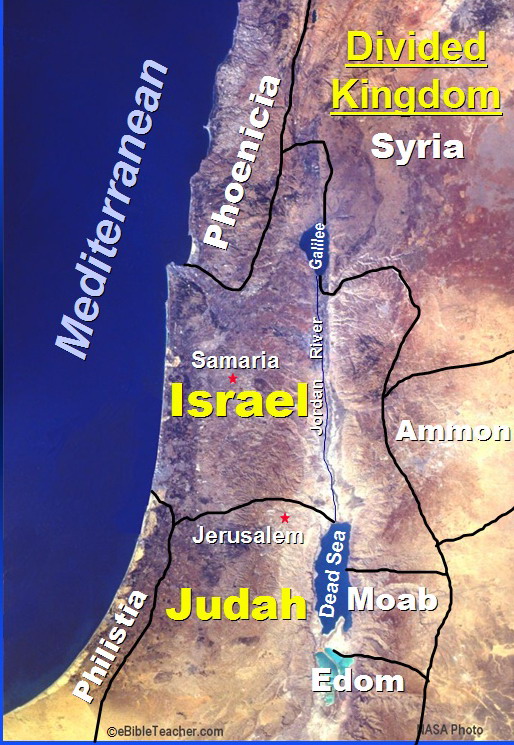Chapter Three
2-Kings. Chapter 3. Jehoshaphat of Judah and Jehoram of Israel are allies in War Again Moab.
SCROLL DOWN\
|
Brit-Am Discussion Group |
Contents by Subject |
Research Revelation Reconciliation Contribute |
|
Site Map Contents in Alphabetical Order |
This Site |
|

|
2-Kings chapter 3:
[2-Kings 3:1] Now Jehoram the son of Ahab became king over Israel at Samaria in the eighteenth year of Jehoshaphat king of Judah, and reigned twelve years.
Jehoram (pronounced Yehoram in Modern Hebrew) the son of Ahab was the brother of Ahaziah (Yehoachaz) reigned before him and had died without issue. The son of Jehoshapat of Judah was also named Jehoram.
[2-Kings 3:2] And he did evil in the sight of the LORD, but not like his father and mother; for he put away the sacred pillar of Baal that his father had made.
It is thought that this sacred pillar was connected to the ALTAR FOR BAAL IN THE HOUSE OF BAAL, WHICH HE HAD [i.e. Ahab] BUILT IN SAMARIA [1-Kings 16:32].
The word in Hebrew translated as "sacred pillar" is "matsavah" which can also refer to the sacred pillars or menhirs and the dolmens that the Celts erected in Gaul and Britian, and Ireland.
[2-Kings 3:3] Nevertheless he persisted in the sins of Jeroboam the son of Nebat, who had made Israel sin; he did not depart from them.
The sin of Jeroboam was the erection of two golden bull calves to represent the God of Israel and the prevention of the Israelites from making the pilgrimage to Jerusalem of Judah [1-Kings 12:28].
Nowadays several "Ephraimite" leaders appear to be continuing the sins of Jeroboam. They seem to go out of the way to invent alternate calendars and explanations of Scripture just for the sake of being different from Jewish practice.
[2-Kings 3:4] Now Mesha king of Moab was a sheepbreeder, and he regularly paid the king of Israel one hundred thousand lambs and the wool of one hundred thousand rams.
Lambs. In Hebrew "carim" meaning "fattened sheep" (Daat Mikra). This mutton together with the wool would have made a handsome income for any kingdom. It must have helped the Israelite economy a great deal and its loss could have had severe effects on the Kingdom. This tribute that Moab had been paying to the Kingdom of Israel may actually have helped the Moabite people. Israelite connections and enterprise would have opened up markets and developed demand that Moab otherwise might not have been able to benefit from.
# and he regularly paid # In Hebrew it says, "ve-heshiv" literally "he would repay". The Commentary Me-Am Lo'az (quotes from Kehilat Yaacov) notes that the King of Moab actually owed this tax. It was a form of reparation. The Moabites in the past had attacked and raided Israel and this tax was a form of monetary compensation.
[2-Kings 3:5] But it happened, when Ahab died, that the king of Moab rebelled against the king of Israel.
So too, the Indians and Africans eventually rebelled against the British Empire even though they themselves were to suffer greatly by doing so.
The rebellion of Moab had began after the death of Ahab in the reign of AHAZIAH and before Jehoram became king.
[2-Kings 3:6] So King Jehoram went out of Samaria at that time and mustered all Israel.
[2-Kings 3:7] Then he went and sent to Jehoshaphat king of Judah, saying, The king of Moab has rebelled against me. Will you go with me to fight against Moab?
And he said, I will go up; I am as you are, my people as your people, my horses as your horses.
It should be remembered that Jehoshaphat king of Judah had married a daughter of Ahab and was therefore a brother-in-law of Jehoram of Israel.
Jehoshaphat had his own reasons for going to war against Moab. In the time of Solomon the Israelites had ruled over Ammon, Moab, and Edom. After Israel and Judah had split apart Edom continued under the suzerainty of Judah while Israel more or less controlled Ammon and Moab. Ammon was also a rich province and later was recorded as providing vast quantities wheat and barley (2-Chronicles 26:5).
At the time under consideration however Ammon and offshoots of Ammon had previously broken away from Israel. Meanwhile Ahab of Israel together with Jehoshaphat of Judah had gone to war against Aram (as we saw in 2-Kings ch.1) and been defeated. After this Judah was attacked by Aram together with Ammon, offshoots of the Ammonites, along with offshoots from Edom (not part of the Edomite Kingdom), and Moab. Judah had been in great danger from this alliance and Jehoshaphat had led the people in prayer, repentance, and supplication before the Almighty. The result was that the Edomite offshoots (from Mount Seir) had quarreled with the Ammonites and Moabites. Fighting broke out amongst them resulting in a great slaughter. All Judah had to do after that was gather up the booty and take care of the dead bodies (1-Chronicles ch.20).
Subsequently Jehoshaphat entered into alliance with the King of Edom who to some degree was subservient to him. Jehoshaphat would also have been interested in any action on the part of Israel to subdue Moab.
[2-Kings 3:8] Then he said, Which way shall we go up?
And he answered, By way of the Wilderness of Edom.
The Commentary Me'am Lo'ez says that the reason they went via Edom was in order to ensure the participation of Edom in their alliance. Edom was subservient to Judah but not wholly under its authority.
[2-Kings 3:9] So the king of Israel went with the king of Judah and the king of Edom, and they marched on that roundabout route seven days; and there was no water for the army, nor for the animals that followed them.
[2-Kings 3:10] And the king of Israel said, Alas! For the LORD has called these three kings together to deliver them into the hand of Moab.
Jehoram of Israel did not deny the Almighty but he thought for some reason God was against him.
[2-Kings 3:11] But Jehoshaphat said, Is there no prophet of the LORD here, that we may inquire of the LORD by him?
So one of the servants of the king of Israel answered and said, Elisha the son of Shaphat is here, who poured water on the hands of Elijah.
It was the custom to pour water over the hands upon awaking in the morning, after relieving oneself, before eating, and often prior to engaging in any especially sacred activity. It was sometimes easier to have someone else do the pouring. In the Temple Service the Levites poured water over the hands and feet of the Cohens i.e. the officiating priests descendants of Aaron brother of Moses. Elisha having poured water over the hands of Elijah showed that he had been especially close to Elijah.
[2-Kings 3:12] And Jehoshaphat said, The word of the LORD is with him. So the king of Israel and Jehoshaphat and the king of Edom went down to him.
Jehoshaphat had heard of Elisha before that.
[2-Kings 3:13] Then Elisha said to the king of Israel, What have I to do with you? Go to the prophets of your father and the prophets of your mother.
But the king of Israel said to him, No, for the LORD has called these three kings together to deliver them into the hand of Moab.
[2-Kings 3:14] And Elisha said, As the LORD of hosts lives, before whom I stand, surely were it not that I regard the presence of Jehoshaphat king of Judah, I would not look at you, nor see you.
[2-Kings 3:15] But now bring me a musician.
Then it happened, when the musician played, that the hand of the LORD came upon him.
Music was sometimes used to induce inspiration and the spirit of prophecy.
Saul before becoming king had been told,
"you will meet a group of prophets coming down from the high place with a stringed instrument, a tambourine, a flute, and a harp before them; and they will be prophesying" (1 Samuel 10:7).
We see here that Elisha used music to reach a state of Prophecy. We too should do the same if we are depressed or have trouble worshipping God as we should. We should use music or whatever legitimate means necessary to improve our mood and do what we have to do.
[2-Kings 3: 16] And he said, Thus says the LORD: Make this valley full of ditches.
Valley. Hebrew "nachal" meaning literally "river" or "stream" but here connoting a dry river bed.
The phrase could preferably be translated:
This river bed shall be made [or become] full of ditches.
[2-Kings 3: 17] For thus says the LORD: You shall not see wind, nor shall you see rain; yet that valley shall be filled with water, so that you, your cattle, and your animals may drink.
This is a known phenomenon in the wilderness where rain may fall some good distance away in the hills etc and the water suddenly flow down through the river bed into areas that are parched for lack of moisture.
[2-Kings 3: 18] And this is a simple matter in the sight of the LORD; He will also deliver the Moabites into your hand.
[2-Kings 3: 19] Also you shall attack every fortified city and every choice city, and shall cut down every good tree, and stop up every spring of water, and ruin every good piece of land with stones.
[2-Kings 3: 20] Now it happened in the morning, when the grain offering was offered, that suddenly water came by way of Edom, and the land was filled with water.
[2-Kings 3: 21] And when all the Moabites heard that the kings had come up to fight against them, all who were able to bear arms and older were gathered; and they stood at the border.
[2-Kings 3: 22] Then they rose up early in the morning, and the sun was shining on the water; and the Moabites saw the water on the other side as red as blood.
[2-Kings 3: 23] And they said, This is blood; the kings have surely struck swords and have killed one another; now therefore, Moab, to the spoil!
It was not an infrequent occurrence for allied armies from different nations to suddenly start fighting each other. The Moabites themselves had suffered from such an experience not long before when they had gone to war against Jehoshaphat together with Ammonites, Edomites, and Aramites and conflict had broken out amongst them (2-Chronicles 20:22 on). In that case it was Judah who had benefited from the spoil. Now the Moabites assumed that what had happened to them previously in turn had befallen the forces of Israel, Judah, and Edom. They thought their turn had come to benefit from the spoil left by their enemies whom they assumed had slaughtered each other!
[2-Kings 3:24] So when they came to the camp of Israel, Israel rose up and attacked the Moabites, so that they fled before them; and they entered their land, killing the Moabites.
[2-Kings 3:25] Then they destroyed the cities, and each man threw a stone on every good piece of land and filled it; and they stopped up all the springs of water and cut down all the good trees. But they left the stones of Kir Haraseth intact. However the slingers surrounded and attacked it.
We would translate (in the light of the Radak and Commentaries) the last section of this verse as:
Only the stone walls of Kir Haraseth remained. The catapult-operators surrounded it and began bombardment.
[2-Kings 3:26] And when the king of Moab saw that the battle was too fierce for him, he took with him seven hundred men who drew swords, to break through to the king of Edom, but they could not.
[2-Kings 3:27] Then he took his eldest son who would have reigned in his place, and offered him as a burnt offering upon the wall; and there was great indignation against Israel. So they departed from him and returned to their own land.
There is a difference of opinion as to who exactly did the king of Moab offer up. The simple meaning is that he sacrificed his own son and successor. This was a known practice. Egyptian depictions of sieges of Canaanite cities exist. They show children being thrown as sacrifices off the wall.
See the illustration below showing an Egyptian siege of the Philistine city of Ashkelon in the ca. 1200s BCE.
 |
The top section of the picture shows some kind of religious ceremony with people lifting their hands to heaven in prayer and children (on each side of the picture) being thrown off the wall in sacrifice.
 Source of Picture: "Archaeology of the Land of the Bible, 10,000-586 B.C.E." by Amihai Mazor, 1990, p.235. |
In the case of the siege of Moab the child was not thrown off the wall but rather offered up as a burnt offering upon it.
Another opinion (see Abarbanel) is that the Moabites had captured the son of the King of Edom and it was he who was sacrificed. Consequently the Edomites, suggests Abarbanel, blamed the Israelites for what had happened and the coalition split up.




